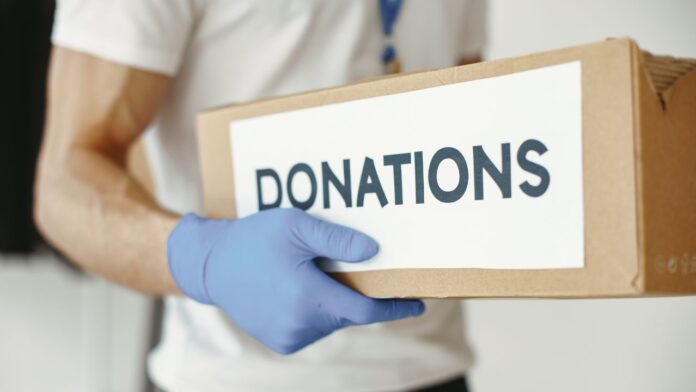To fund workforce services, charities rely on donated items. While it’s great to donate gently used items, there are things you shouldn’t take to a donation center.
There are seven categories of things most donation centers cannot accept. Each category contains a variety of items. Check to make sure that the items you want to donate aren’t on this list, before making the trip to the donation center.
1. Furniture
Furniture is not accepted at most thrift shop donation centers. They are often too big and too heavy. They might be in need of repair, and they are difficult to clean properly. Furniture items include:
- Beds, mattresses, and box springs
- Dressers and nightstands
- Couches and recliners
- Tables and chairs
- Pianos
- Desks
- Bookshelves
- Filing cabinets
- Television stands
Skip the donation center if you have any of the above items to donate. Instead, try giving the item(s) away to a neighbor.
2. Electronics
You can donate some electronics at donation centers; however, donation centers will not take all electronics. The most common electronics that get turned away at donation centers are tube-style (CRT) televisions and computer monitors. These devices are old enough that the technology is usually more difficult to repair and maintain than a new device.
If you are looking to donate a CRT TV or computer monitor, check with your city’s recycling center to see if they accept them. Recycling is the best option if a CRT TV or computer monitor cannot be repaired or reused.
3. Large Appliances
Donation centers are unable to accept any large appliances, even if they are in good working condition.
Some large appliances contain the chemical Freon and must be stored or disposed of properly. Donation centers do not have the ability to store, recycle, or dispose of anything containing freon. Large appliances that use freon include refrigerators, freezers, and air conditioners.
Other large appliances that cannot be donated through a donation center include:
- Furnaces
- Water heaters
- Trash compactors
- Large console stereos
If you want to donate a large appliance not on this list, you should call your local donation center. They will be able to tell you whether or not they accept your item.
4. Weapons
Donation centers will not accept weapons of any kind, including guns and ammunition. There are laws and regulations on selling firearms.
You can get rid of your gun(s) or ammunition in a few other ways. Consider taking your items to a gun buyback event, community gun disposal event, or selling to a legal gun dealer.
5. Building Materials
New and used building materials are generally not accepted by donation centers for resale. Building materials include:
- Paint and paint thinner
- Tools powered by gasoline
- Toilets and sinks
- Plumbing fixtures
- Flooring
- Carpeting
- Padding
- Tile
- Vinyl
- Wood
- Lumber
- Fencing materials
You can make a donation of some battery-powered and electric hand tools. If you are unsure whether or not your item is an accepted building material, speak with a donation center attendant before making your donation.
6. Personal Care Items
Donation centers cannot take any open or used personal care items, including:
- Nail polish and remover
- Shampoo and conditioner
- Body wash and soap
- Shaving cream
- Deodorant
- Hairspray
- Makeup
- Perfumes
If you have unused and unopened personal care items, your local donation center can accept them.
7. Hazardous Materials
You have to store or dispose of hazardous materials properly. Most donation centers cannot receive any type of hazardous materials, including household chemicals and hazardous automotive waste. Donation centers do not have the ability to store the items or dispose of them if they expire or go bad.
-Household Chemicals
Household chemicals and cleaning products are potentially dangerous, especially when expired or exposed to other chemicals. Do not donate household chemicals, opened or unopened. Items include:
- Pesticides
- Drain cleaner
- Oven Cleaner
- Aerosol sprays
- Bleach
- Detergents
- Furniture polish
These items need to go to a disposal center if you no longer want or need them.
-Outdoor Chemicals
Chemicals commonly used outside also cannot go to a donation center. These items include:
- Gasoline mixtures for lawn equipment
- Fertilizers
- Pool chemicals
- Lubricating oils
- Acids
Like with household chemicals, outdoor chemicals should be taken to a disposal center if you do not want them.
-Automotive Waste
Not all automotive waste seems hazardous, but automotive waste is not accepted at most donation centers. Car parts should be handled by automotive professionals in the proper setting. Items include:
- Car parts and tires
- Lead-acid batteries
- Radiator additives
- Brake fluid
- Antifreeze
You can take unwanted automotive waste to a car parts reseller or disposal center in your area.
Workforce Services and Programs
Workforce services and programs provided by charities are funded by selling donated items at thrift shops. The programs and services greatly benefit members of your community. Here are a few services and programs charities are able to provide with your help:
- Interview preparation
- Job placement services
- Career counseling
- Training programs
- HiSET classes
- Child care
Thrift shops and charities in your area need help to fund the programs and services they provide. You can help improve the lives of people in your community by donating clean and gently used items for resale.

